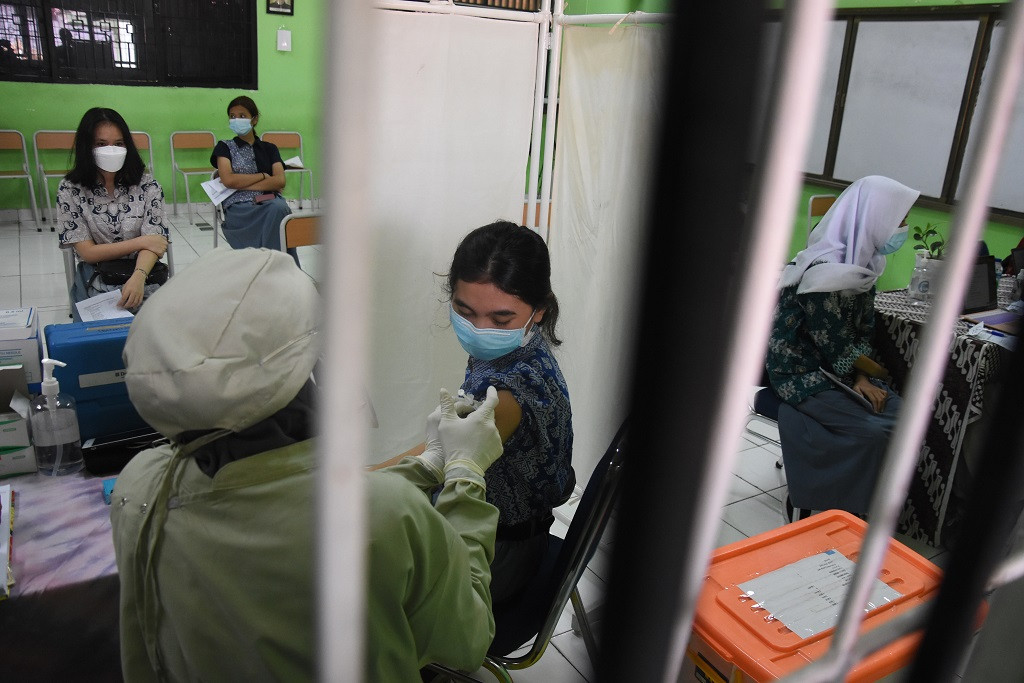Popular Reads
Top Results
Can't find what you're looking for?
View all search resultsPopular Reads
Top Results
Can't find what you're looking for?
View all search resultsGovernment begins vaccinating children
Jakarta is leading the way for COVID-19 vaccinations for children aged 12 to 17, as part of redoubled efforts to stem the tide of infection and reach herd immunity.
Change text size
Gift Premium Articles
to Anyone
T
he government has started administering COVID-19 vaccines to children aged 12 to 17 in an attempt to bring down infections among young people, while emergency restrictions dash hopes of resuming in-person learning in the near future.
In response to a slew of record-breaking new cases and deaths over the past week, the country has been ramping up its pandemic response as it battles one of Asia’s worst COVID-19 epidemics.
The government’s augmented response has included the decision to fast-track vaccinations for school-age children, with Jakarta leading the charge at a high school on Thursday.
At state senior high school SMAN 20 in Central Jakarta, the site of the city’s first school-age vaccination drive, Jakarta Governor Anies Baswedan said his administration aimed to inoculate 1.3 million kids listed in the city’s records.
The number is a fraction of the 23-25 million children that the government is targeting for vaccination nationwide, according to Health Ministry vaccine affairs spokeswoman Siti Nadia Tarmizi.
“Children can now receive COVID-19 vaccines in community health centers and other health facilities anywhere in the country,” Nadia told The Jakarta Post.
She said the number of children vaccinated would be kept in proportion to the number of available vaccines.
Read also: To vaccinate children or not? Doubts linger amid COVID-19 surge ahead of school reopening
Children are currently eligible to receive China’s Sinovac Biotech vaccine, which on June 27 became the first to be authorized for emergency pediatric use by the Food and Drug Monitoring Agency (BPOM).
Health Minister Budi Gunadi Sadikin said prior to the BPOM decision that the Pfizer-BioNTech vaccine was also being considered for use on children.
BPOM head Penny Lukito confirmed this on Friday, saying studies showed that the Pfizer jab could be used on children as young as 12. The firm can register the vaccine with the BPOM with the help of a local pharmaceutical partner.
The Pfizer jab has already been authorized for emergency pediatric use in dozens of countries, including the United States, Canada, the United Kingdom and a number of European Union countries.
The decision to inoculate children has come as a welcome surprise to several health experts, as school reopenings have been pushed back because of a surge in cases attributed to the Delta variant of the virus.
Children were not part of the initial plan to achieve herd immunity through mass vaccination, but that changed as the government announced stricter mobility policies under the emergency public activity restrictions (PPKM Darurat).
And while some parents are open to the idea of sending their children back to school – provided all school employees have been vaccinated and schools implement stringent health measures – others are still wondering when or if their children should be vaccinated.
Experts say children are, in fact, quite vulnerable to the disease and that Indonesia is one of the few nations to have experienced a spike in cases among children.
“COVID-19 vaccinations for children are still very important,” Griffith University epidemiologist Dicky Budiman told the Post recently.
“This is an emergency situation, so vaccination, testing and tracing must still be carried out, even if it is not deemed urgent enough [for children], especially with the delayed school reopening,” he said.
Read also: COVID-19 rising among Indonesian children
To ensure that child vaccinations were effective at curbing the spread of the virus, Dicky said, other members of the household must also be inoculated.
Indonesian Pediatric Society (IDAI) chair Aman Bhakti Pulungan said it was high time for children to start getting vaccinated.
According to the group’s calculations, children aged 10 to 18 have a 30 percent chance of dying of a COVID-19 infection. Toddlers have an even higher chance.
“If we delay COVID-19 vaccinations for children, we’ll lose more of them in the future,” Aman told the Post recently.
Data from the national COVID-19 task force shows that, as of June 24, children made up more than 12 percent of infections nationwide, equal to some 250,000 cases. The IDAI has reported that the number of children who have caught the virus has almost tripled since May.
Aman noted that the actual numbers could be higher, as testing was not prevalent among children and young people were typically brought to healthcare facilities only once they displayed moderate to severe symptoms.
He also said children could be susceptible to “long COVID-19”, a condition where patients who have recovered continue to experience symptoms, potentially impairing childhood development and quality of life.
“Children are our responsibility. They are our human capital. Who else will replace us 20 to 30 years down the road if not them,” Aman said during a recent discussion with the National Child Protection Commission (KPAI).










